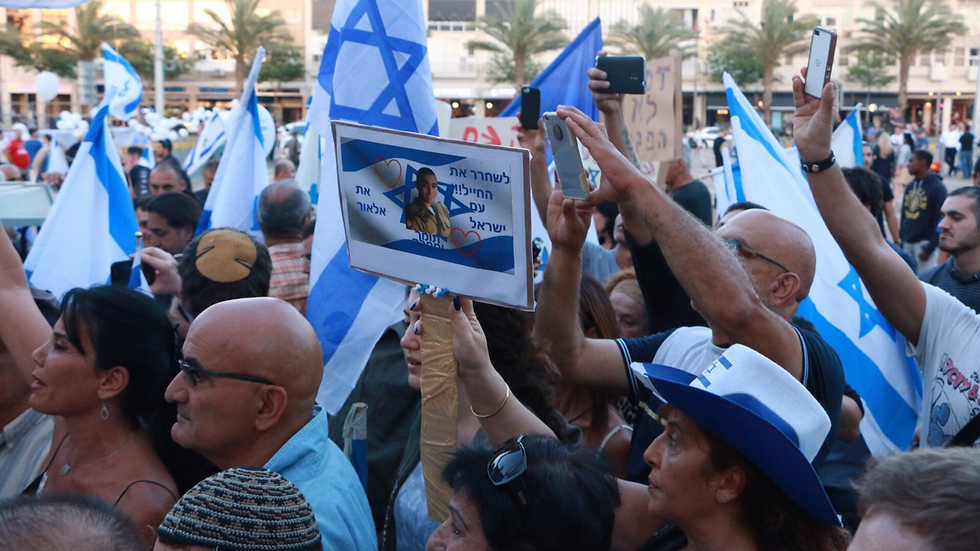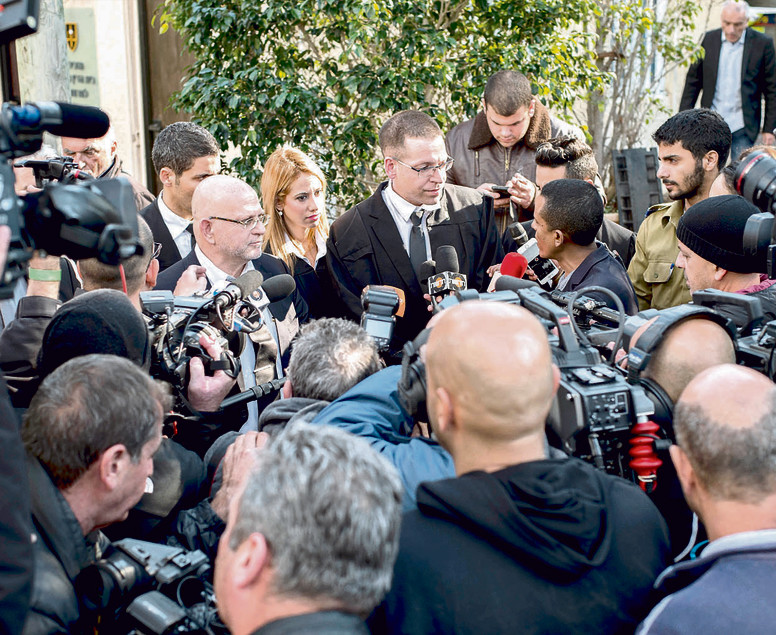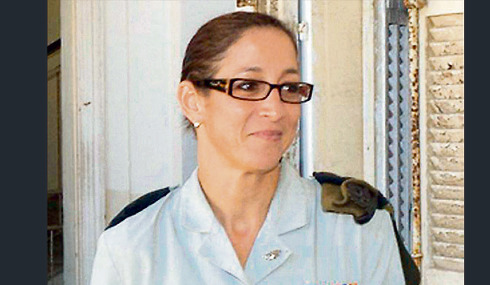

Lawyers say if not for them, Elor Azaria would have gotten 10 years in jail
After leading the defense team in one of the most emotionally charged trials in Israeli history and being heavily criticized for it, attorneys Ilan Katz, Eyal Besserglick and Carmit Shchiver fight back and explain why they quit the case when the soldier’s family decided to appeal the 18-month sentence.
The two lawyers, who had led the defense in one of the most emotionally charged cases in the history of the State of Israel for a year, advised the young soldier not to appeal the sentence. They believed that the punishment he had received just several days earlier, 18 months in prison, was an accomplishment. Furthermore, they said to Azaria, it might be possible to shorten the sentence, and maybe even receive a pardon from the president, which would scrub his criminal record clean. And one more thing: To their understanding, if Azaria would not appeal the sentence, neither would the army. “And so,” they said last week in a special interview to Yedioth Ahronoth, “Elor could have gone home within four or five months.”

“We told him, ‘Don’t make a decision just yet,’” says Katz. “Elor asked questions like: ‘I was walking in the base and I met someone who asked me if I was the soldier who shot the terrorist. What do you think about it?’”
The tense conversation lasted for about 10 minutes. “He listened to us and asked all the necessary questions,” Adv. Besserglick says. “Azaria said he would let us know the next day, but he didn’t. There was a real struggle. I spoke the following day with his father, Charlie, who said that Elor had decided to go for the appeal. The truth is that we already realized that in the morning from all the stuff published on the family’s Facebook pages.”
Everyone knows what happened next: Attorney Yoram Sheftel took the lead in the case and decided to file an appeal. Shortly afterwards, the Military Advocate General decides to file its own appeal. Defense attorneys Katz, Besserglick and his wife Carmit Shchiver quit the case. Azaria, who—according to his resigning lawyers—could have been released soon, embarked on a new legal battle and no one knows how it will end.
One year earlier, Thursday, March 24, 2016.
Attorney Ilan Katz receives a phone call from attorney Lior Epstein, who shares an office with him. “Listen, are you familiar with today’s incident of the shooting soldier in Hebron? Sharon Gal approached me and said that the family was looking for a military lawyer. I recommended you.”
“I didn’t know who Sharon Gal was apart from the fact that he used to be a Knesset member,” Katz recalls. “Would it be considered rude to ask you to come to the family home in Ramla?” Gal asked him, and Katz replied that he was on his way. Half an hour later, he arrived at the family home, where he met the people who became his partners in Azaria’s legal battle and his “friends for life,” as they define it—Adv. Eyal Besserglick and his wife and partner in the law firm, Adv. Carmit Shchiver.
Since that Thursday about a year ago, the three lawyers have become good friends. Katz, a veteran cigar smoker who enjoys a fine whiskey, introduced the habit to Shchiver, and during the interview at the Besserglick home in the central city of Kiryat Ono, the room is filled with smoke. “It’s the effect of the year we spent with Ilan Katz,” Besserglick laughs, and Carmit smiles as she inhales the “light” cigar Katz bought her.
And so not even 24 hours had passed from the moment Azaria shot the neutralized terrorist in Hebron, and a decisive meeting was already held in the family home in Ramla led by Sharon Gal and in the presence of the three lawyers.
“Each person introduced himself, and Charlie, Elor’s father, said: ‘I’m okay with you representing him,’” Katz recounts. “He said, ‘You’ll all represent him. As far as I’m concerned, you’ll be several lawyers together defending Elor,’” Besserglick adds. Sharon Gal decided that Katz would lead the defense team and decide who would be interviewed and what the defense line would look like. At the end of the day, Azaria’s defense counsels were Katz, Besserglick, Shchiver and attorney Ben Malka, with Besserglick and Katz serving as the pleaders who led the case.
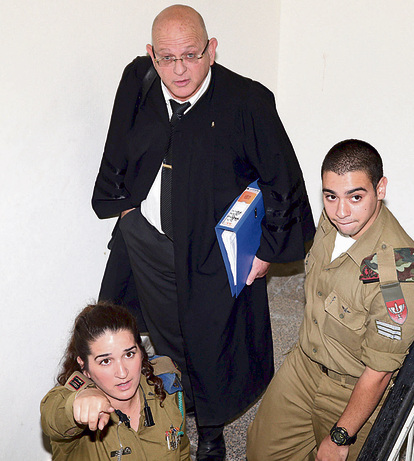
Azaria’s defense counsels say they put their lives on hold for the trial, which ended (for now) with an 18-month jail term, after a serious verdict. They believed wholeheartedly that in the current state of affairs, appealing the verdict would only cause damage and worsen Azaria’s situation. They are still fully convinced that they were right. “If it were not for us,” they say, “Azaria would have gone to prison for 10 years.”
“There was a judge, whose name I won’t mention, who told me to take a seven-year deal and shut up,” says Adv. Besserglick. “It was a showcase trial, which was run like a showcase trial. And in spite of everything, eventually we won.”
When Adv. Sheftel came into the picture and convinced the Azaria family to appeal the sentence, the lawyers announced their decision to quit the case and not to take part in the appeal process. Now, following serious insults from Sheftel, they are fighting back and revealing what happened behind the scenes of the trial which rocked the entire country in the past year.
You were criticized quite a lot by jurists over the way you handled the case.
“We heard all our critics, all the fellow members of our profession and all the commentators,” Katz says, making no effort to hide his anger. “They said that if Azaria had said from the very beginning that he was wrong and that he made a mistake and had asked for forgiveness, this whole saga would not have taken place and he would have walked away with a lighter sentence.
“So as for the light sentence, he would have sat in jail for seven to 10 years. As for expressing remorse, these are things that are raised in a mediation proceeding, and we didn’t even reach such a proceeding. The army turned down the mediation option. The prosecutor stood there and rejected it. Even the judges said to him, ‘At least go and consult (Chief Military Advocate General Brigadier-General Sharon Afek).’ He went, came back and again refused to do it.”
Eyal, did you push for an expression of remorse from Elor during the sentencing arguments stage?
“I did,” Besserglick confirms. “There were differences of opinion between me and Ilan on this issue, and in the end it was decided that he wouldn’t do it. In retrospect, I’m not sure it would have changed the severity of the punishment.”
Without Sharon Gal
The person who was in charge of handling the media in the Azaria trial and who raised funds for the family’s battle was Sharon Gal, who joined the “Big Brother” reality show as a contender shortly before the judges handed down the sentence. Gal was very involved in the trial, and the Azaria family listened to his advice.
How were you paid for your work?
“We received the legal fee from the association, which was created to raise funds on Headstart (a crowdfunding platform—ed). The money was received via wire transfers. We were given the fee for the first trial as agreed. We did not receive the fee that was agreed for the appeal, although we are the ones who wrote the appeal after splitting the work between us. And so it happened that we phrased 49 pages of the appeal. That’s that takes a month to write. But we don’t care about the money in this case. Elor’s success is what we care about.”
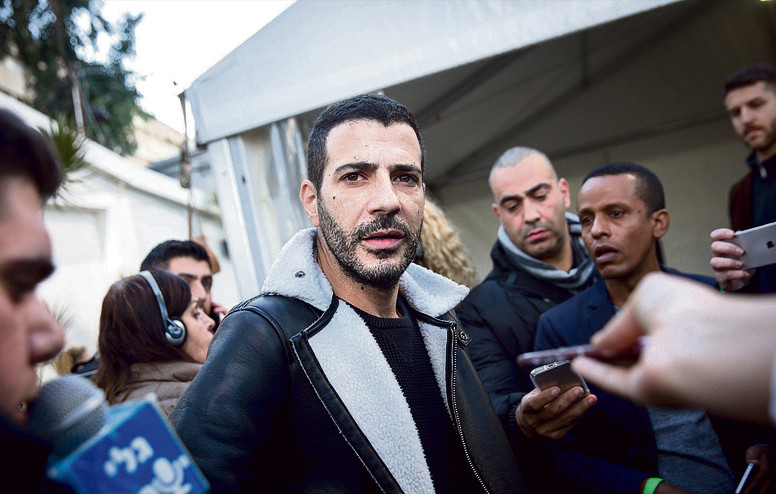
Did Sharon Gal intervene in the legal decision as well?
“The entire professional proceedings were solely between us. I must say in favor of the father, Charlie, that he didn’t argue and didn’t dispute any decision we made in the case. Until the appeal,” says Katz.
“In preparation for the appeal, Sharon told us that he would try to get more donations and that we would get a fee. When we realized that the family was afraid that if our approach—of not seeking an appeal—would be accepted, there would be no money for mitigation of punishment requests, pardon requests, parole committees, etc., we told them explicitly that they should relax and that we would do it voluntarily,” Katz reveals.
It was reported that before entering the ‘Big Brother’ house, Gal left behind a note with instructions. Is that true?
“They said that Sharon left us a note, but we’re still looking for it,” Katz laughs. “I never saw such a note. It’s true that it was clear to Sharon and to us that there would be an appeal, but when we saw a punishment of only a year and a half, it was a scenario we hadn’t considered. The sentence’s arguments could have also helped mitigate the punishment in the future. We realized that we had to reassess the situation rather than be irrationally stubborn. We said, ‘Let’s see what’s good for this boy, how do we get him tomorrow morning to the best situation possible as far as he’s concerned.’
“For nearly a year, I saw this family live in uncertainty from one court session to another. Now, they are being brought into the saga of what will happen with the appeal. Charlie suffered a medical collapse, and Oshra (Azaria’s mother) lost a lot of weight. We, unlike attorney Sheftel who was busy with his radio show, were in daily contact with them, including conversations after discussions in which we saw his mother shattered. We care a lot about the family. It’s a responsibility.”
“Their entire life changed after the incident,” Besserglick adds. “With all their strength, it’s very difficult. We established a very close relationship with them, so we were surprised by how easy it was for whoever wanted to convince them to move on with the appeal to actually convince them. Of course we respect their decision. They are the client. We feel for them.”
Katz is convinced that if Sharon Gal had not entered the “Big Brother” house before the lenient sentence was handed down, an appeal would not have been filed. “I believe that if Sharon were available, and we sat down with him and explained the practical issue to him, it’s not something that he would have dismissed. People said that all Sharon cared about was the publicity and his platform, etc. I saw his relationship with the family over the past year, and I really saw that he connected to them, on the emotional level as well. If we had been able to sit down and explain it to him, I’m not sure that he would have agreed to file the appeal.”
Militant, respectable conduct
The affair began on March 24, 2016, when two terrorists from the West Bank city of Hebron arrived at the IDF post in Tel Rumeida and stabbed a soldier. One of them was shot to death and the other was seriously wounded. Several minutes later, Sgt. Elor Azaria shot him in the head and killed him. Following an operational probe, the Military Police’s Investigation Unit launched an investigation against Azaria, and he was prosecuted in the Central Command’s military court. In early 2017, Azaria was convicted of manslaughter and inappropriate behavior and sentenced to 18 months in prison, a 12 month-probation and a demotion to the rank of private.
Following the intensive public interest in the affair, the defense counsels became media stars. Now, however, they say that in such a case, the affair should be silenced as much as possible. “In a case like this, our first interest as lawyers is to actually make the client go underground,” Besserglick explains. “Simply make him disappear from the media’s eyes. That’s the strategy in every case like this.”
So why did you do the exact opposite?
“Because in this case, even before we got involved, only several hours after the incident, we already heard about ‘a soldier who transgressed, an army that has become brutalized.’ The IDF spokesman said immediately afterwards that it was a serious and improper incident in the army. Everyone spoke to the media and everyone had something to say. At some point, someone in the IDF Spokesperson’s Unit called a person who was editing a very important document in this case and shouted at him, ‘Why are you messing with our case?’ I won’t mention his name.”
“They called Magen David Adom Director-General Eli Bin,” Adv. Katz reveals.
Is that why you went to extremes too?
“We didn’t agree to radicalize our media policy,” Katz says. “I can honestly say that I didn’t like the Rabin Square protest either. At first, they claimed that Elor was a member of La Familia (the Beitar Jerusalem soccer club’s far-right supporters’ group—ed) and that he was affiliated with Kahane Chai (a radical, ultranationalist Jewish Orthodox movement—ed). It was taken out of context, because all the things he posted on Facebook were during the abduction of the three Jewish teens and shortly after their bodies were found. If you check the posts of many young people, you’ll see the exact same texts.
“It annoyed me that Elor was associated with radical elements like La Familia. Eyal and I harshly criticized the IDF commanders and Defense Minister Moshe Ya’alon and Chief of Staff Gadi Eisenkot. But the moment people say, ‘Gadi, be careful, Rabin is looking for a friend (referring to the assassination of former Prime Minister Yitzhak Rabin),’ we’re not there. As a retired colonel and as law-abiding citizens who have only one army, we are disgusted by such a comment.”
At the end of one of the sessions, as she left the military court in Jaffa, Adv. Shchiver saw groups of protestors on both sides of the road—on one side, a demonstration in solidarity with Azaria, and on the other side, a demonstration against him. She spotted a few of her Arab clients from Jaffa among the anti-Azaria protestors, and stopped by to shake their hands.
“She went to shake their hands, because she knows them, and Azaria’s supporters nearly lynched her,” Besserglick recalls.
It’s not easy working on such an emotionally charged case with your wife.
“Carmit brought the case to our law firm. She has a very strong sense of things and a very healthy logic and good internal considerations. She is razor-sharp. In a case like Elor Azaria’s, the court sessions sometimes ended at 11 pm. In the first year of our marriage, we were mostly preoccupied with Elor and didn’t have too much time for ourselves. Carmit often joked that I had married Elor, not her. Because of the intensiveness of the case, he was present during the weekends as well.”
The violence outside the courthouse didn’t stop. On the day Channel 2 News commentator Amnon Abramovich was attacked outside the military court in Jaffa by a pro-Azaria protestor, Katz came out in his defense and was verbally attacked himself. “I don’t agree with all his views,” he says, “but Abramovich was nearly killed in the Yom Kippur War and received a citation. I’m not sure if all these radical protestors went to the army. I called them ‘a mob’ on Facebook, and then the accusations against me began.”
“Every moment we walked through the courthouse, there were representatives of the IDF Spokesperson’s Unit next to us,” Besserglick says, “like two guards everywhere. Everything we said was transmitted. I once went to the toilet, and that was also reported directly to the IDF Spokesperson’s Unit.
“One of the things that turned Elor into a matter of consensus, in my opinion, was our conduct. It was militant, but in a national and respectable way within the boundaries of the appropriate discourse. The moment you divert from the appropriate discourse and reach sentences like ‘thirsty for blood’ (as Adv. Sheftel said), you lose it.”
Yoram Sheftel's arrival
On the evening before the court handed down the sentence, tensions were high at the Azaria home. The family members were convinced that the punishment would be more than three years in prison.
“A jail term of a year and a half is a success,” says Adv. Katz. “I believed they would hit him hard. I understood which way the wind was blowing in the court. That was also the reason why we decided not to go for an appeal. Before the sentence, we said to ourselves: ‘He’ll get three years.’ That’s why we prepared an appeal.”
But when you left the military court after the 18-month sentence was delivered, you declared that you would appeal it anyway.
“Let’s put things on the table,” says Besserglick. “The punishment level which was eventually accepted in this case was a punishment level of unlawful use of weapon, shooting against procedures, causing death by negligence on the low level. The Military Advocate General reached a deal of 28 months for a soldier who accidentally killed a friend. An Egged bus driver got a year and a half in prison for causing a road accident which left one soldier dead. We couldn’t have asked for a better outcome under the circumstances of the video documenting the shooting and of the state of mind in the command system.
“After the court ruling, we received a phone call from Sharon Gal, who said: ‘I’m adding my friend Yoram Sheftel to the appeal.’ It was later clarified that he would lead the defense team in the appeal. Sharon said, ‘I want you all to get credit for Elor’s acquittal.’ He repeated it several times. We said that if he wanted to bring Sheftel in, there was no problem.”
“I accepted it unequivocally,” Katz stresses. “Eyal pondered the issue. I told him it was very important for us to be in this appeal, and that reality would dictate how it would work. If the punishment had been three years, we would have definitely been there.”
“I did pconsider the issue,” Besserglick says, “and today Ilan agrees with me. I thought the line of action would escalate. Even if the punishment had been more than two years, we would have been there.”
One of their first conflicts with Sheftel was over the recording of the Kfir Brigade commander, Colonel Guy Hazut, who arrived at the Azaria home to discuss the continuation of legal proceeding.
“We didn’t receive a report about the conversation with the Kfir Brigade commander in real time,” says Katz. “We only knew about it the following day. We turned to the IDF Spokesperson’s Unit, and their response was that the conversation was only about the terms of the arrest, and this approach was also adopted by the Kfir Brigade commander later on. We decided that we didn’t want to harm the Kfir Brigade commander, because we didn’t think that harming an officer was the right approach. We turned to the defense minister, to the chief of staff, to the IDF Manpower Directorate and to the IDF Spokesperson’s Office, and CC’ed the chief military advocate general.
“Less than 24 hours later, we saw that Sheftel had issued a letter demanding that the Military Police’s Investigation Unit launch an investigation against the Kfir Brigade commander. We didn’t know about the letter and we didn’t ask for it, because we didn’t want to take this line of action.”
The worst thing, as far as they are concerned, happened during the press briefing outside the military court in the Kirya base in Tel Aviv, a moment after the sentence was handed down.
“We left the courthouse after the sentence and were surprised to see Mr. Sheftel virtually grabbing the microphone,” says Besserglick. “The reporters told him that he should perhaps let the people who handled the case for year talk, and then came the comments of ‘thirsty for blood’ and everything else. We looked at each other and just wanted to disappear. Ilan was a colonel, I was an outstanding soldier, and so was Carmit. None of us would have ever agreed to such an approach. Two things bothered me in that situation: The speech made by a person who wasn’t even familiar with the case, and the fact that he said the words ‘scum of the earth’ to a prosecutor inside the courthouse.”
Personal insults
About two weeks ago, Sheftel submitted to the Military Court of Appeals an email he received from Adv. Besserglick. The email said that the chief military advocate general had told Besserglick that the Chief Military Prosecution would appeal the lenience of the sentence, only if Azaria filed an appeal. Sheftel referred to this move as “extortion by threats.” As far as Besserglick and Katz are concerned, he crossed a red line.
How did the Azaria family feel when you left?
“The family didn’t think that we abandoned them, but understood what we believe in. We are neither PR people nor politicians, and we didn’t come to promote ourselves. We are lawyers, and an appeal means even more money for us, but we don’t believe in it. As I said, we were willing to work for free for the mitigation of the punishment and everything it takes for the boy to spend as little time as possible in jail.”

The Azaria family was summoned to Adv. Katz’s office a day before the lawyers’ meeting with the chief military advocate general. “I summoned them, and we sat with them for two hours,” Katz says. “We told them that we were going to meet with the chief military advocate general, and they agreed.
“Another bluff is that Sheftel says we went to meet with the chief military advocate general behind his back. We asked Sheftel if he was okay with that, if it could benefit the family, and he said yes. And then we said to ourselves that perhaps we were wrong, perhaps Sheftel was actually a pragmatic person. But then Sheftel went and said that the chief military advocate general blackmailed us. We deal with defendants who blackmail, and I’m very sorry, but no one will blackmail us. It’s so demagogic, saying that the chief military advocate general blackmailed us. We came to negotiate, and the other side, the chief military advocate general, said that he didn’t want to talk about what was next, but that he was open to anything.”
“For the first time, we heard the chief military advocate general say that he was open to everything else: A pardon, a mitigation, a parole board. ‘You won’t file an appeal and we won’t file an appeal, and then we’ll talk’—that was the message,” says Besserglick.
“When the chief military advocate general comes and tells you, ‘I am open to anything’—he can’t say more than that. As we said, if we had continued handling his case, Azaria could have gone home within four or five months.”
How would that have happened?
“He is entitled to a deduction of one-third of the sentence, that already leaves a year,” Katz elaborates. “The army would have accepted a mitigation request. We would have also applied for a pardon, because it’s important in terms of the criminal record. It would have been erased—if not today, then in three years. There is a very big lobby, and the president would have eventually erased it.”
“We spoke to Sheftel after the meeting with the chief military advocate general,” says Katz. “We explained everything to him. He said three things to us, although he didn’t have the information yet: ‘I will convince the family to file an appeal’; ‘I’m dying for the Military Advocate General to file an appeal,’ although that won’t help the client; and third, ‘You are expected to attend the press conference, because it will harm the appeal if you won’t be there.’ I heard it and said to myself, ‘God help us. What is he trying to do at Elor’s expense? You have a practical solution here.”
Despite all the criticism, Katz has a surprising compliment. “Sheftel is an excellent jurist and a very smart person. I don’t want to express my opinion on a lawyer who files an appeal before receiving all the information about the case. He doesn’t have it yet. I believe that he will have full knowledge of the facts during the actual discussion. He is an experienced lawyer, but that’s not the point.”
“This is a matter of having full knowledge of the information,” says Besserglick. “You can’t do that when you don’t have the information. That’s the main issue. I don’t know if the family is aware of the fact that he doesn’t have the information, and that troubles me.”
It’s possible that now, after serving as his defense counsels during the trial, attorneys Besserglick and Katz will have to testify before the Military Court of Appeals on behalf of Azaria, if Sheftel decides to summon them.
“If we are asked to come and testify on behalf of Elor, we will show up of course,” Besserglick says. “Sheftel wants to establish an abuse of process argument (due to a flaw in the legal proceeding or abuse and persecution by the authorities) based on that email. It’s absurd, and it’s the worst thing one could do for Elor.”
Katzs interrupts him and says, “If they had decided to file the appeal, without saying that ‘the lawyers abandoned and were scared, they didn’t believe in the chances of the appeal’—you know what? I would have saluted such a move. There is a lawyer who says, ‘I want to fight to the very end and I think that justice is more important than anything,’ so go ahead. If the client carries it on his shoulders, that’s great. But the moment you prepare an excuse in advance for the day after, for when the appeal you filed is not accepted, and say that it’s because of the previous lawyers—that’s wrong. It’s a move which should be condemned and it isn’t true.”
“Sheftel is leading the family to a state of confusion and to emotional turmoil,” says Besserglick. “I assume he told them that we wanted out of the case.”
“A lawyer who sees himself as respectable, instead of offering practical arguments, takes the previous lawyer and slings mud at them and gives interviews every day. I got a phone call from Channel 2 that Sheftel was being interviewed and that they wanted me to speak too. I said to them, ‘Forget about it, guys. I’m not stooping to that level.’”
“Since we left the case, almost everyone wanted to interview us, and Sheftel is giving interviews left, right and center,” says Besserglick. “As far as I’m concerned, it means that like the prosecutor after the sentence, Sheftel is also in a real state of distress right now. He spoke as if we had taken the case to promote ourselves. According to Sheftel, Sharon Gal wanted to fire us immediately after the verdict, and he insisted that we stay. If what Sheftel is claiming is true, well, the keys are now in his hands.
“What I see is mainly dealing with the press, hiring a PR office. We didn’t have a PR office, we had ourselves. After all, you came to us to get the best service for Elor, and to this very moment we haven’t heard a single complaint that we did him a disservice. We will also continue to offer them advice as much as we are required to, but not with this approach. We won’t follow Sheftel, who is following the crowd, which he believes he represents. That’s who he is appealing to. That’s the reason he is doing it, not in order to save the client. Everything that is being done right now is not for the client, but in order to justify the day after. For us, who really care about Elor, it’s very painful to see this.”
According to Besserglick, the public sympathy they managed to enlist for Azaria is fading away. “It’s a problem for the way the case is being managed. With us, good manners came before anything, and that’s not the case now. Ilan referred to the command system as a ‘junta’ and I called the conduct that followed the incident a ‘mafia’ —but to say that we are being blackmailed by someone? No. There is a feeling that whoever says we are being blackmailed is being blackmailed himself by the desire for personal publicity. The sins of the past seem to contribute to the conduct in the future.”
“In this case, we criticized the entire command system and the chief military advocate general in an unusual manner,” says Katz. “If I were a coward and I were only thinking about my next case, I wouldn’t have attacked the chief military advocate general. When a clown comes along and calls me chicken and a coward, my heart doesn’t miss one beat, because I know what I’m worth and what I have done. My commanders in the army always told me, ‘You are going to serve in the territories, in Jenin and in Ramallah, while the Kirya boys avoided these places.’ So I’m a coward?”
“Sheftel’s tongue-lashing points to a lot of distress,” says Besserglick. “A senior criminal defense lawyer told me that Sheftel had asked him to help him talk to the chief military advocate general. Sheftel claimed it took him hours to help the family recover from being abandoned by us. it apparently took him three hours to convince the family that we deserted them. Even now, we very much want Elor to succeed, definitely in the appeal. We are very fond of the Azaria family. After the appeal, there will be no one to talk to. When you tell someone that he is bloodthirsty and all kinds of demagogic comments, if the appeal is unsuccessful, God forbid, no one will be willing to talk to them.”
So what are you afraid of?
“That if, God forbid, the appeal is rejected for all kinds of reasons, Elor will be exposed to an aggravated sentence.”
“Bringing Sheftel into the case will only make things worse,” says Adv. Shchiver. “Unfortunately, that can be seen in the prosecution’s appeal against the lenience of the punishment. I really hope that he cares about Elor, but it seems that all he cares about is self-publicity. Throughout the way, the only thing we saw before our eyes was Elor’s wellbeing, nothing else.”
The remorse dilemma
Despite the criticism voiced against them by many of their colleagues, the defense counsels say they wouldn’t have done things differently, apart from the issue of the pathologist who determined that the terrorist had already been dead before Azaria shot him.
“In retrospect, I wouldn’t have gone into this issue of the pathologist,” says Katz. “I think that legally we were right to go into it, but it was wrong from a practical perspective. As a defense counsel, you can’t legally give up a claim of pathologist who tell you that the person was dead.”
Another key issue the defense counsels dealt with was Azaria’s expression of remorse. “When you say remorse, you don’t mean, ‘I’m guilty, forgive me,’” Katz explains. “You mean, ‘Had I known in retrospect that he wasn’t carrying an explosive charge, I wouldn’t have shot him.’ That’s what we thought was right. Since attorney Sheftel already saw the appeal, he thought it wouldn’t be right to say that. I was inclined to accept Sheftel’s position, because I know the court and I know judges. They would say that he didn’t mean what he said. There are dozens of court rulings in which they say that the defendant didn’t express remorse throughout the entire trial, but only a minute before the sentence. Fortunately, the sentence speaks for itself. I don’t think that if he had expressed remorse, he would have received a day less than a year and a half.”
After Sheftel called the prosecutor, Lieutenant Colonel (res.) Nadav Weisman, “scum of the earth,” Besserglick and Katz initiated a conference call with Weisman to apologize. “We were scolded by Sheftel, who said that he was very disappointed in us,” Besserglick recalls. “That’s not our style. We are not there. I could have quarreled and shouted at the prosecutor and walked out of the hall, but there are red lines which must not be crossed.”
According to Adv. Besserglick, soldiers were threatened not to testify on behalf of the defense in favor of Azaria. “Some of the witnesses refused to come, until we said we would cause trouble. They were so intimidated not to serve as defense witnesses. That’s very unusual, the complete obedience in the preparation of the prosecution’s witnesses compared to the unwillingness to testify on behalf of Elor, because they were really threatened. They told us that,” he claims. “In our opinion, the prosecutor in the case crossed the red lines and violated the ethical rules. We believe he also made the chief military advocate general do what he wanted and not the opposite. He didn’t want mediation under any circumstances. Nevertheless, we won’t accept the line of action led by Sheftel.”
'Elor is involved in everything'
Elor Azaria himself, according to his defense counsels, was very involved in the legal proceedings behind the scenes, although he tried to keep a straight face in front of the media. “We told him everything,” says Besserglick, “including about the chances of an appeal.
“Elor is very involved in what is happening. We spoke to him in person hundreds of times. He is the type of person who asks about everything and wants to know. He is interested and wants to understand. If his father, Charlie, didn’t understand something, he would tell us to talk to Elor.”
Throughout the entire trial, the defense counsels criticized the panel of judges at the military court, led by Colonel Maya Heller. Now, they reveal that they considered submitting a request to disqualify her from hearing the case quite a few times.
“We faced a court, especially a court president, who were very hostile,” Besserglick says. “It was the first time in my 12 years in this profession that I felt the need to say, ‘If Her Honor feels she is not objective, we would like to know that so that we could act accordingly.’
“In the end, we have a verdict which ignores nearly all the evidence and we have a sentence which accepts the exact same evidence. Anyone who reads the verdict and the sentence without identification marks is unable to even link between them,” Besserglick adds.
“We harshly criticized the court’s conduct, and especially the head of the panel, but we made certain to stress in the closing arguments that we had never claimed that the court system was not independent. The judges did not receive dictations from above. I said that the judges were biased, but not because someone had told them what to do. Sheftel wanted to write in the appeal that the judges had been promoted during the trial and that the payment was the result. How could we join such an appeal?”
Bogie’s politics
Throughout the trial, the defense lawyers were accused of promoting themselves at the expense of Azaria, who gained the people’s support and extensive media coverage. One of the people who made this accusation was former Defense Minister Moshe (Bogie) Ya’alon.
“Saying that we engaged in politics and that the poor family didn’t understand that is absurd. The only person who engaged in politics and failed to protect a soldier under his command was Bogie. One of the things which made the family suffer and made the soldier miserable was Bogie’s comments. He even set a defense line, became a lawyer,” Besserglick says in response to Ya’alon’s comment that the defense counsels should have told Azaria to confess and express remorse.
“The person who decided to engage in politics at Elor Azaria’s expense, while establishing a new party, is Mr. Bogie Ya’alon. I would expect him to shut up. He caused enough damage to this family with all his comments and it’s time for him to stop engaging in politics at their expense. If we had done what Bogie wanted, Elor would have gone to jail for seven to 10 years.”
Responses
Attorney Yoram Sheftel offered the following response: “As for the story of the Kfir Brigade commander, Adv. Besserglick and Adv. Katz were fully aware of the letter addressed to him. They didn’t make any comment or express any reservation. The brigade commander’s cross examination was planned by them, in the context of the letter as well. When they say that they were troubled by the statement that ‘the prosecution is thirsty for Elor’s blood,’ they made it unequivocally clear to me that it was not this statement which they apologized for to the prosecutor and that they had no problem with this statement and shared my exact opinion. Because I respect them, I will not say what they told me about the prosecutor and about his conduct during the trial.
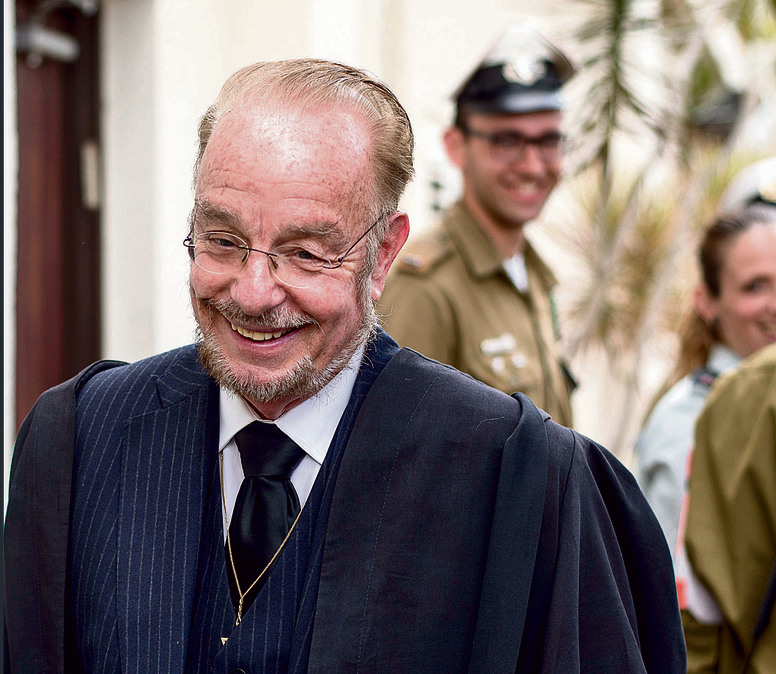
“They fled the case for two reasons: One, the meeting with the chief military advocate general, in which he informed them that if Elor would file an appeal, the chief military advocate general would file an appeal against the punishment’s lenience. The meeting was held behind my back and I knew nothing about it, until they informed me about it in a conversation the following day. Two, in the afternoon hours before the meeting, we were still conversing, heading towards an appeal. Saying that they wrote all the pages of the appeal is a despicable lie. All the deceitful things said by these two small crooks should be examined in a similar manner. It’s true that I told them, after their conversation with me about the meeting with the chief military advocate general, that I was hoping to convince the family not to panic following their escape from the case.
“I was indeed stressed out about filing the appeal, because they had informed me less than two days before it had to be filed that they were fleeing the case, and they were supposed to write additional parts of the appeal, beyond the partial appeal that I had written on my own and submitted to the court on Wednesday, which was the last date to file the appeal. Saying that I was ‘dying’ for the Military Advocate General to file an appeal is as true as their statement that they are the ones who wrote the appeal that was filed.
“Claiming that I wanted to establish an abuse of process argument based on the email they sent is also inaccurate, to say the least. As I wrote, the request to receive this email as evidence in the appeal is in order to present the chief military advocate general’s worthless arguments in filing the appeal.
“I did say to the family members and to the soldier Elor himself—and that is indisputable—that the previous defense counsels wanted to flee the case, following their meeting behind my back with the chief military advocate general, and that’s what they did. The claim that I sling mud at them in my interviews to the media is complete deceit. In made sure to say in every interview, although I don’t believe in it myself, that the defense counsels had done a very good job and that the accusations against them in the media that they mishandled the case were evil and nasty accusations by the chief military advocate general’s mouthpieces.
“Moreover, Sharon Gal did want to fire both of them immediately after the verdict, and I am the one who prevented it, first and foremost in order to allow them to save face. I used the services of the Zeliger Shomron Communications office for specific needs, like summoning the media to the press conferences I held immediately after filing the appeal to the military course, as well as in order to distribute the request to submit further evidence which I submitted to the court.
“Finally, another deceitful comment made by these two is that I had turned to some senior criminal defense lawyer, asking him to help me talk to the chief military advocate general. It was quite the opposite. A criminal defense lawyer, who can definitely be defined as senior, approached me at his own initiative to help reach a plea bargain that would make Elor’s current situation much easier.
“The public will judge the conduct of the previous defense counsels in this case immediately after Sharon Gal comes out of the ‘Big Brother’ house. In retrospect, I am really happy that they fled the case. The help I am already receiving from attorney Einat Gloser is immensely greater than any help those two could have provided me with as part of the preparation and argumentation of Elor Azaria’s appeal.”
The IDF Spokesperson’s Unit offered the following response: “We regret the collection of fibs and half-truths presented by Sergeant Elor Azaria’s former representatives. They are continuing the line of action they adopted throughout the trial, repeatedly directing groundless accusations at the Military Advocate General, the court, his commanders, the IDF Spokesperson’s Unit and others.
“Sgt. Elor Azaria was convicted of a serious offense of manslaughter, in a clear and profound verdict, which conveys unequivocal messages about the army’s values and the importance of maintaining battle norms. The Military Advocate General acted professionally and in a businesslike manner throughout the process. The prosecutor, Lieutenant Colonel (res.) Nadav Weisman, acted responsibly and in full coordination with his commanders, and the claims made against him are baseless and outrageous.
“We stress that the Military Advocate General’s decision to file an appeal against the punishment’s lenience was made for legal reasons, which were detailed in the appeal, including a deviation from the appropriate level of punishment, as well as the soldier’s failure to take responsibility.
“The army has no intention of addressing misleading and distorted comments which were made in alleged violation of the ethical rules, in regards to the meeting which was held with the chief military advocate general at the request of the soldier’s representatives. We stress that contrary to what has been claimed, it was unequivocally clarified in the meeting that the issue of a mitigation of the sentence or a pardon was not up for discussion.
“The claims made against the judges in the case, including Colonel Maya Heller, are unworthy of a response and we strongly condemn them. The judges in the military courts act according to the principles applied in all courts in Israel, including—first and foremost—independence. We stress that the proceeding was held in public and in full transparency, and the trial minutes speak for themselves. At no stage was a request submitted to disqualify a judge. The overall claims made by the representing defense counsels will be examined by the court of appeals.”
The office of Moshe Ya’alon offered the following response: “Former Defense Minister Moshe Ya’alon is not the one who ruled that the soldier violated IDF orders and values, but rather his commanders who conducted the operational probe. Former Defense Minister Ya’alon did not order the Military Police’s Investigation Unit to launch an investigation. It was the decision of the chief military advocate general—a decision which is required by the Military Justice Law. In the verdict, the military court reinforced the results of the operational probe and all its details and conclusions.
“Had the def ense counsels in the Elor Azaria trial spent more time defending him and less time attacking his commanders, led by the chief of staff, and mainly attacking former Defense Minister Ya’alon personally, they would have done the soldier and his family a better service. The military court judges’ verdict is also a serious indictment against the defense counsels over their conduct in the trial.
“Ilan Katz has been working and speaking against Ya’alon since being released from his service in the IDF, due to Ya’alon’s unwillingness as chief of staff to grant him the personal rank of brigadier-general, as well as in light of the fact that he was not appointed chief military advocate general.”
The Magen David Adom emergency service declined comment.














